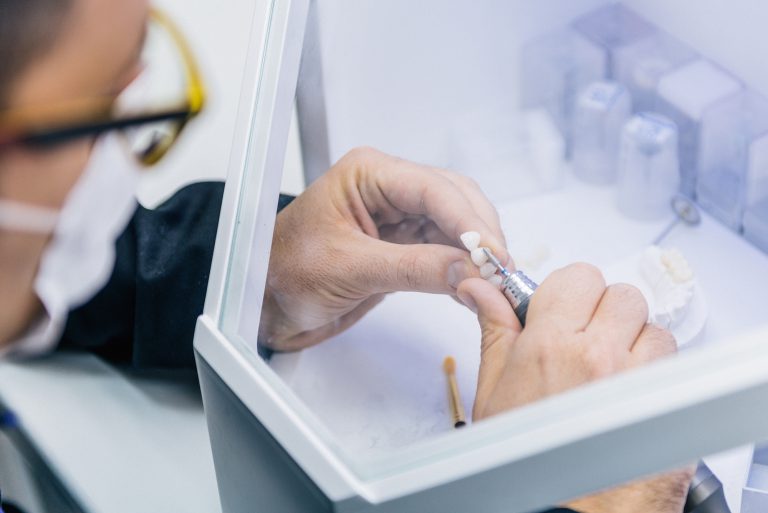
What are dental implants?
An implant is a small metal screw that replaces an entire tooth. In a brief surgical procedure, the dentist inserts an implant into the bone beneath your gums right in the spot where a tooth should be. The implant acts like a natural tooth root and is finished off with a restoration such as a dental crown to help it look and feel just like a real tooth.
Getting dental implants is a big deal. You think you might like an implant, but you aren’t sure what to expect. We explain everything here so that you can make an informed decision about your dental treatment.
Why you might need dental implants
Your natural teeth provide support for the height and shape of your smile, and they allow you to eat and speak comfortably.
A gap in your smile could allow your other teeth to drift out of healthy functional alignment. If that happens, your risk of developing oral health problems increases. Losing just one tooth can trigger a chain of events in your mouth that negatively impact your oral health, the appearance of your face, and your overall quality of living.
Even if you don’t experience these effects of missing teeth, there’s one problem you can’t avoid: bone resorption. This is a natural process in which your body breaks down non-essential bone tissue to use the minerals elsewhere in your body.
When you have teeth in your jawbone, they push against it and stimulate the production of new bone tissue. But once those teeth are gone, that bone tissue serves no useful purpose, so it slowly dissolves away. The result? A shortened jaw and chin that cause wrinkles and give your cheeks and lips a sunken appearance.
Having dental implants is the second best thing to having natural teeth. You can prevent or correct the issues listed above by replacing lost teeth with implants.

The Benefits of dental implants
Losing a tooth can be devastating. A missing tooth can make us feel self-conscious about our smile and may lead to a variety of health problems. Gaps can make your bite feel uncomfortable, cause difficulties eating the food you love and may lead to bone loss or shifting teeth.
- Restore your natural appearance - Dental implants look and feel like your own teeth. They become permanent, “perfect” teeth as they are custom made to blend in with your smile. Implants look natural because they are sized, shaped and colored to match your unique bite and natural enamel color.
- Feel confident in your comfort - When a dental implant is placed your jaw bone actually fuses with the titanium post as it heals. A crown or bridge can be permanently affixed to the post or the implant may be used to secure implant-supported dentures but one thing is certain: That dental implant is not moving. Laugh, smile and eat your favorite foods. Shifting teeth or sudden pain won’t even cross your mind.
- Improve bone strength - When teeth are lost, the bone that supports those teeth can begin to atrophy and weaken over time. Dental Implants stimulate new bone growth around the implant, strengthening the bone structure.
Dental implants are a long-term solution that feels natural and lasts decades with proper oral hygiene.

Dental implant restorations
A restoration is the “false tooth” that covers the implant. The implant is not visible when you smile, but the restoration that covers it is what makes it look like you have a new tooth.
- Dental Crown - This is the most common implant restoration, and it covers a single-tooth implant.
- Dental Bridge - A bridge spans the gap in places where multiple teeth in a row are missing. You can replace several teeth with just one or two implants that support a dental bridge. A full implant-supported bridge is an entire arch of upper or lower teeth that are fixed to four or more implants.
- Implant Denture - Give a removable denture more stability by clipping it onto two small implants.

A new life with dental implants awaits!
Your smile won’t be the same after you get a dental implant; it’s going to be much better.
Dental implants are easy to maintain and care for. Gently brush and floss your implant daily and protect it from injury while playing sports. Visit us periodically for checkups so that we can make sure your implant is staying healthy.
In return, your dental implant could reward you with many years of strong, happy, and beautiful smiles!
Start today by booking a consultation
How it feels
Although having a metal implant inserted into the bone of your mouth sounds painful, the procedure is far more comfortable than you might expect.
We will numb your mouth with a mild anesthetic so that you don’t feel any pain during the surgery. Advanced dental technology allows us to place implants quickly, accurately, and conservatively. This means less discomfort and downtime for you during recovery.
Some implant patients report feeling bored and even sleepy during the brief half hour it takes to place their implant. The most uncomfortable part for you may be having to hold your mouth open for a few minutes at a time, but that’s all.
It is normal to experience some swelling, discomfort, and even bruising in the next several hours after the procedure. The pain is mild and very easy to manage, however. We will give you specific instructions so that you can start minimizing the discomfort before the anesthetic wears off. Your surgical implant site should start feeling better within a week.
It might help you to know that dental implants have a success rate of nearly 95%. Getting an implant is one of the safest and most predictable procedures in dentistry.

What To Expect On Your Dental Implant Treatment Journey
The actual implant placement process is much more comfortable than you might imagine.
Assessment
First, you’ll have a dental implant consultation to find out if implants are right for you. Your dentist will take X-rays and a 3D cone-beam CT scan of your jaw to evaluate the bone tissue and plan your treatment. The dental team will take a scan or impression of your teeth to help them plan the angulation of your implant.
Inserting the implant
We administer an anesthetic so that the surgical site will be completely numb. The dentist creates a small hole in the gums and bone of your mouth. The dentist places the implant post in the hole. Sometimes (but not always) sutures are needed to close up the gums.
Finalizing the restoration
When the implant is deemed solid we will make an impression for the permanent crown. We will send this off to the lab and when the permanent crown is ready you will come back to the practice and we will place the restoration. You will leave with a brand-new and fully functional tooth.
Contact us today
to schedule an initial consultation & exam.
Your consultation will include an examination of everything from your teeth, gums and soft tissues to the shape and condition of your bite. Generally, we want to see how your whole mouth looks and functions. Before we plan your treatment we want to know everything about the health and aesthetic of your smile, and, most importantly, what you want to achieve so we can help you get there.
Cost of dental implants in St. Paul
In St. Paul you can expect to pay approximately $3,000 - $6,000+ for a single implant. Full-mouth reconstructive dental implants can cost anywhere from $6,000 to $60,000 and up. The cost for a full set of implant-supported dentures averages out to about $30,000. Keep in mind that no dental practice can provide you with an accurate quote over the phone. The dental implant procedure is very complex and depends on many factors that are unique from person to person.
- The type and number of implants you need.
- The materials and supplies that are used.
- The time and experience of the dental team that will be with you every step of the way.
- The location and complexity of the surgery.
- Your recovery time. We will be here for you for as long as you need us.
How is the cost of dental implant surgery determined? Here are some important factors:
Every case is different so it's important to speak with a dentist and to have an oral exam to allow us to evaluate your unique situation and provide you with different treatment options to consider. We would be happy to provide you with a more accurate quote.
Are there other solutions for missing teeth?
Gaps caused by 1 to 3 missing teeth can sometimes be repaired with a dental bridge. A lot of missing teeth on the top or bottom or the whole mouth may be repaired with a dental prosthetic or removable dentures. When comparing the cost of dental implants to other tooth-replacement options it is important to consider the pros and cons.
Dental implants may require a steeper initial investment but they are more secure and durable than bridges or dentures. Removable dental prosthetics require different care and maintenance and you may need to have them adjusted or replaced as you age. By contrast, you take care of your dental implant like you would take care of your natural teeth, with routine oral care at home and routine dental exams. With proper care, a dental implant can last a lifetime.
Frequently Asked Questions









